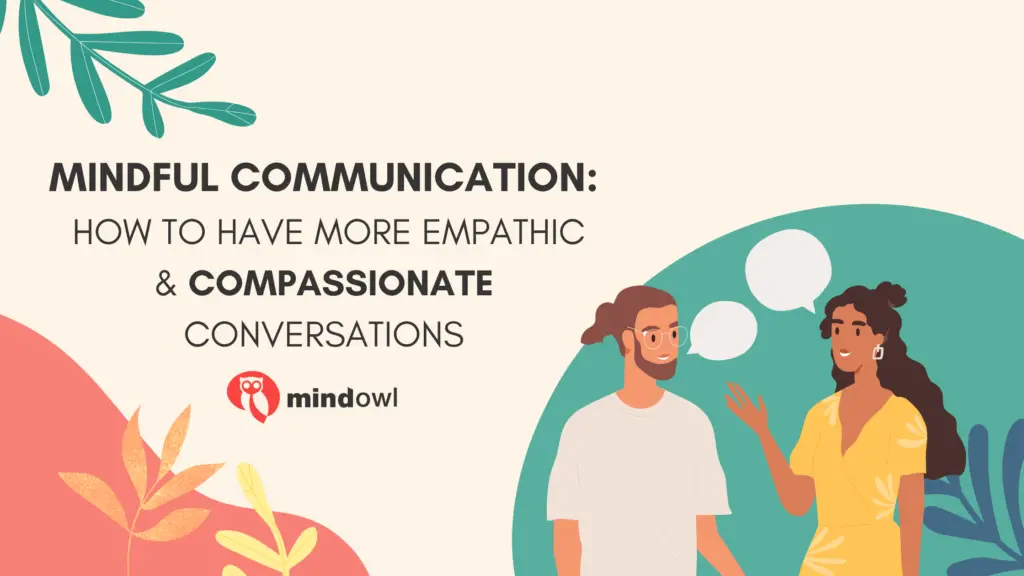Can a simple shift in how we communicate truly transform our relationships? The answer, increasingly supported by research and practical experience, is a resounding yes. Mindful communication, a practice rooted in awareness and intention, offers a powerful pathway to stronger, more fulfilling connections with those we cherish. This article will explore how to navigate the complexities of human interaction with greater clarity, empathy, and resilience.
The modern world, with its constant connectivity and rapid-fire information flow, often fosters a culture of reactivity. We are bombarded with messages, demands, and expectations, leaving little space for thoughtful consideration. This environment can easily spill over into our personal lives, leading to misunderstandings, conflicts, and a gradual erosion of intimacy. However, by embracing mindful communication, we can reclaim control over our interactions and cultivate deeper, more meaningful bonds. This involves cultivating a deeper awareness of our own thoughts, feelings, and reactions, and learning to express ourselves with greater clarity, honesty, and compassion. Furthermore, mindful communication empowers us to listen actively to others, to understand their perspectives, and to respond with empathy, even in the face of disagreement.
Heres a detailed look at key aspects of Mindful Communication, outlining its core principles and demonstrating how to apply them practically:
| Aspect | Description |
|---|---|
| Awareness of Self | This involves recognizing your own emotions, triggers, and communication patterns. What are you feeling in the moment? What underlying beliefs are shaping your response? Identifying your ego's influence (e.g., the need for validation or the tendency to take things personally) is crucial. |
| Active Listening | Going beyond simply hearing the words to truly understanding the speaker's perspective. This involves paying attention to both verbal and nonverbal cues, asking clarifying questions, and reflecting back what you've heard to ensure understanding. |
| Non-Violent Communication (NVC) | NVC provides a framework for expressing needs and feelings in a clear, honest, and empathetic way. It involves observing without judgment, identifying feelings, acknowledging needs, and making specific requests. |
| Empathy | The ability to understand and share the feelings of another person. This requires putting yourself in their shoes and seeing the world from their perspective, even if you don't agree with them. |
| Mindful Expression | Choosing your words carefully, speaking with intention, and expressing yourself in a way that promotes understanding and connection rather than conflict. |
| Managing Reactivity | Learning to pause before reacting, especially when triggered. This involves recognizing your emotional state and choosing a more thoughtful response rather than acting impulsively. |
| Conflict Resolution | Approaching disagreements with a willingness to understand, empathize, and find mutually agreeable solutions. This might include compromise, negotiation, or seeking professional mediation. |
The journey towards mindful communication often begins with self-reflection. As pointed out, understanding how your ego impacts your communication is a critical first step. The ego, with its inherent need for validation, praise, and approval, can subtly (or not so subtly) influence our interactions. It might lead us to take things personally, to engage in constant comparisons, or to become entrenched in rigid thinking. By recognizing these tendencies, we can begin to challenge them and adopt a more compassionate and open-minded approach.
To address the impact of the ego, consider these strategies:
- Self-Awareness Exercises: Regularly practice mindfulness techniques, such as meditation or deep breathing, to cultivate a greater awareness of your thoughts and emotions.
- Journaling: Write about situations where you felt triggered or reacted negatively. Explore the underlying beliefs and needs that fueled your response.
- Identifying Ego Triggers: Recognize the people, situations, or topics that tend to activate your ego. What is it about these triggers that evokes a strong reaction?
- Challenging Negative Thoughts: When you notice negative thoughts or judgments arising, question their validity. Are they based on facts or assumptions?
- Practicing Self-Compassion: Be kind and understanding towards yourself, especially when you make mistakes. Treat yourself with the same compassion you would offer a friend.
Researchers have increasingly been exploring the positive impact of mindfulness interventions on relationships. Studies have shown that mindfulness can help people resolve or avoid conflict, improve their communication skills, and reduce stress. By learning to be present in the moment, to observe thoughts and feelings without judgment, and to respond with greater awareness, individuals can foster more authentic and fulfilling connections.
- Vega Stream Watch Online Alternatives Where To Find It
- Movierulz 2025 Telugu Tamil More Movies Shows Updates
The benefits of mindful communication extend beyond personal relationships. These principles can be applied in various settings, including the workplace, community, and even online interactions. Mindful communication is a key element of building effective teams. When team members communicate with clarity, empathy, and respect, they are more likely to collaborate effectively, resolve conflicts constructively, and achieve common goals. In fact, through platforms like LinkedIn, professionals can readily access resources and courses designed to enhance their communication skills and build stronger relationships.
Here's how you can integrate mindful communication into your daily life:
- Before Speaking, Pause: Take a breath before responding. This allows you to gather your thoughts and choose your words more carefully.
- Listen Actively: Give the speaker your full attention. Make eye contact, nod, and ask clarifying questions to show that you are engaged.
- Use "I" Statements: Express your feelings and needs using "I" statements (e.g., "I feel frustrated when..." instead of "You always...").
- Practice Empathy: Try to understand the other person's perspective, even if you don't agree with it.
- Be Open to Feedback: View feedback as an opportunity for growth. Listen without defensiveness and ask for clarification if needed.
- Manage Your Emotions: If you feel yourself getting angry or upset, take a break and calm down before continuing the conversation.
- Focus on the Present Moment: Avoid dwelling on the past or worrying about the future. Stay present in the conversation.
- Cultivate Self-Compassion: Treat yourself with kindness and understanding, especially when you make mistakes in your communication.
- Practice Gratitude: Take time each day to appreciate the positive aspects of your relationships.
By incorporating greater awareness into your daily communication, you can make the process of resolving relationship differences less challenging and more oriented toward a stronger connection. Mindful communication offers a way to relieve tension and address challenges proactively.
Consider the following characteristics, as emphasized in resources like the "Mindful Communication for Less Conflict and Stronger Relationships" course:
- The Ego and Its Impact:
- Seeks validation, praise, and approval externally.
- Takes things personally.
- Compares constantly.
- Exhibits rigid thinking.
One key to success in this area is patience. It takes time and effort to shift deeply ingrained communication patterns. Be kind to yourself, celebrate small victories, and remember that the journey towards mindful communication is a process, not a destination. The benefitsstronger relationships, reduced conflict, and increased well-beingare well worth the effort.
In the long run, good communication can deepen and enrich a relationship which poor communication might otherwise damage or even end. The goal is not to achieve perfect communication, but rather to cultivate a consistent practice of awareness, empathy, and intention. The more we practice mindful communication, the more naturally it will become, and the more profoundly it will transform our relationships. Some tips for better communication include:
- Be Present: Give the other person your full attention. Put away your phone, turn off the TV, and focus on the conversation.
- Listen Actively: Pay attention to both verbal and nonverbal cues. Paraphrase what you hear to ensure understanding.
- Speak Clearly and Concisely: Avoid rambling or using vague language. Get to the point and express your thoughts and feelings clearly.
- Use "I" Statements: Express your feelings and needs using "I" statements rather than blaming or criticizing the other person.
- Be Empathetic: Try to understand the other person's perspective, even if you don't agree with it.
- Be Respectful: Treat the other person with courtesy and respect, even when you disagree.
- Avoid Interrupting: Let the other person finish speaking before you respond.
- Ask Open-Ended Questions: Encourage the other person to share more by asking questions that require more than a "yes" or "no" answer.
- Be Open to Feedback: Be willing to receive and consider feedback, even if it's difficult to hear.
- Practice Forgiveness: Let go of grudges and move on.
- Explore Somali Wasmo Channels On Telegram Your Guide
- Movierulz 2025 Telugu Tamil More Movies Shows Updates


